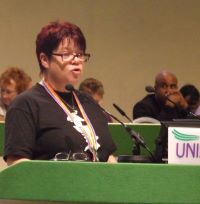Conference rejects Energy
move to open reserved seats up to both men and women
 |
|
Scotland's Elaine Duffy opposed
the move
|
Leadership in the Energy Service Group will
highlight in the wider union the difficulties faced by
Energy branches
in trying to fill seats reserved for low paid women.
Despite
delegates to the Energy Conference voting for these
to be opened
up to both men and women who are low paid, a National
Conference rule change failed and the status quo will remain.
Scotland’s Elaine Duffy, a member of the Energy
Service Group Executive, spoke against the motion. She
told delegates that the Executive supports the spirit of
the motion and acknowledges the good work of stewards in
the Energy Sector in achieving equal pay and decent rates
of pay for all members. She recognised that men too can
be low paid and said that the Service Group would never
seek to disenfranchise any of their members from becoming
active in the union.
“However, we cannot lose sight of the fact that
low paid women are consistently the most under-represented
group within our union, despite having reserved seats at
all levels.
She added, “We have over a million
women members, over two thirds of our membership. We must
make every effort
to ensure these voices are heard and we should continue
to encourage the involvement of these women at every level.
After all, some of our best activists in our union have
started out in reserved low paid women’s seats.”
She pointed out that there is an appeals
mechanism for branches who cannot meet the requirements
of proportionality
and fair representation despite their best efforts. “We
believe this process is sufficient to allow a branch to
appoint a male low paid member if a woman is not able to
fill this
seat.”
A rule amendment on this issue, subsequently debated at
National Delegate Conference, was overwhelmingly lost,
so the status quo remains.
UNISON
joins Energy Bill Revolution: UK site
UNISON has joined the Energy Bill Revolution, a consortium
of trade unions, children's charities, environment groups,
health and disability groups and businesses. They are calling
on the government to use the money it raises from carbon
taxes to counter fuel poverty.
top
top



